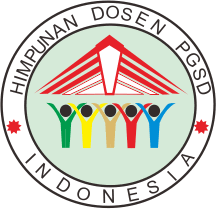Evaluasi terhadap pengelolaan kelas melalui punishment dan reward pada proses pembelajaran daring di kelas II di sekolah dasar
Abstract
This study aims to describe the evaluation of classroom management through reward and punishment in the online learning in Class II SD Djama'atul Ichwan. The research approach used is descriptive qualitative. The data in this study are the results of interviews with grade II teacher and grade II students, observations, documentation, and teacher’s archive. Sources of data in this study were grade II teachers, grade II students, and the online learning process. Data collection techniques are carried out by observation, interviews, and documentation. The instruments used in data collection are observation tables and a list of questions. This study used interactive analysis techniques consisting of data collection, data reduction, data display, and conclusions. The validity of the data was tested by observing persistence and triangulation of data sources. The results of the study showed that, the four stages of evaluation carried out by the teacher were collecting information from various parties (teachers, students, student’s parents), self-evaluation by reflecting on the results of information collection, and periodic evaluation of methods showing good results. The level of discipline, learning motivation, learning effectiveness, student enthusiasm for learning and the conduciveness of the classroom atmosphere are optimal but no change in method was found during the study.
Keywords
Full Text:
PDFReferences
[1] A. Faidy and I. Arsana, “Hubungan Pemberian Reward Dan Punishment Dengan Motivasi Belajar,” Kaji. Moral dan Kewarganegaraan Nomor, 2(2), pp. 454–468, 2014.
[2] A. R. Syahrul, “Reward, punishment terhadap motivasi belajar Siswa IPS Terpadu Kelas VIII MTsN Punggasan,” J. Curricula, 2(1), pp. 1–9, 2017, [Online]. Available: file:///C:/Users/asus/Downloads/1040-5480-1-PB.pdf.
[3] P. Silaban, R. Lumban Gaol, A. Abi, and H. Situmorang, “Pengaruh Reward Dan Punishment Terhadap Hasil Belajar Matematika Siswa Kelas Iii Sd Hkbp,” J. Educ. FKIP UNMA, 6(2), pp. 278–281, 2020.
[4] I. S. Wulandari and T. Hidayat, “Pengaruh Pemberian Reward and Punishment terhadap Motivasi Belajar Ssiwa dalam Pembelajaran Passing Bawah Bola Voli (Studi pada Siswa Kelas VIII SMP Negeri 1 Yosowilangan Lumajang),” Int. J. Data Mining, Model. Manag. 3(3), pp. 217–251, 2011, doi: 10.1504/IJDMMM.2011.041808.
[5] R. Indrawati and A. Maksun, “Peningkatan Perilaku Disiplin Siswa Melalui Pemberian Reward dan Punishment dalam Pembelajaran Penjasorkes pada Siswa Kelas XII IPS 1 SMA Negeri 1 Lamongan,” J. Pendidik. Olahraga dan Kesehat.1(2), pp. 304–306, 2013.
[6] Firdaus, “Esensi Reward dan Punishment dalam Diskursus Pendidikan Agama Islam,” J. Pendidik. Agama Islam Al-Thariqah, 5(1), pp. 19–29, 2020, doi: 10.25299/al-thariqah.2020.4882.
[7] I. Melinda and R. Susanto, “Pengaruh Reward dan Punishment Terhadap Motivasi Belajar Siswa,” Int. J. Elem. Educ. 2(2), pp. 81–86, 2018, [Online]. Available: https://ejournal.undiksha.ac.id/index.php/IJEE.
[8] S. Anggraini, J. Siswanto, and Sukamto, “Analisis Dampak Pemberian Reward And Punishment Bagi Siswa SD Negeri Kaliwiru Semarang,” J. Mimb. PGSD Undiksha, 7(3), pp. 221–229, 2019.
[9] D. Yana, Hajidin, and I. Safiah, “Pemberian Reward dan Punishment sebagai Upaya Meningkatkan Prestasi siswa kelas V di SDN 15 Lhokseumawe,” J. iImiah Pendidik. Guru Sekol. Dasar, 4(1), pp. 1–23, 2016.
[10] I. Mahmudi, “CIPP. Suatu Model Evaluasi Program Pendidikan”,” At-Ta’dib, 6(1), p. 23, 2011.
[11] Y. B. Bhakti, “Evaluasi Program Model CIPP pada Proses Pembelajaran IPA,” JIPFRI (Jurnal Inov. Pendidik. Fis. dan Ris. Ilmiah), 1(2), pp. 75–82, 2017, doi: 10.30599/jipfri.v1i2.109.
[12] D. Ramadhani, I. M. S. Mahardika, and N. Indahwati, “Evaluasi Pembelajaran Pjok Berbasis Daring Terhadap Tingkat Pemahaman Dan Motivasi Belajar Siswa Kelas Iv - Vi Sd Negeri Betro, Sedati - Sidoarjo,” J. Ilm. Mandala Educ. 7(1), pp. 328–338, 2020, doi: 10.36312/jime.v7i1.1817.
[13] K. Heru, “Pengaruh reward dan punishment terhadap motivasi belajar siswa pada mata pelajaran Matematika di SMP Yasidik Parakansalak,” Pendidik. Mat. 0812(50), pp. 491–496, 2019, [Online]. Available: http://www.proceeding.unindra.ac.id/index.php/DPNPMunindra/article/view/618/201.
[14] K. Rizkita and B. R. Saputra, “Bentuk Penguatan Pendidikan Karakter pada Peserta Didik dengan Penerapan Reward dan Punishment,” Pedagog. J. Ilmu Pendidik. 20(2), pp. 69–73, 2020, doi: 10.24036/pedagogi.v20i2.663.
[15] H. Subakti and K. H. Prasetya, “Pengaruh Pemberian Reward and Punishment Terhadap Motivasi Belajar Bahasa Indonesia Siswa Kelas Tinggi Di Sekolah Dasar,” J. Basataka, 3(2), pp. 106–117, 2020, [Online]. Available: http://jurnal.pbsi.uniba-bpn.ac.id/index.php/BASATAKA/article/view/93.
[16] A. Syawaludin and S. Marmoah, “Reward and Punishment in the Perspective of Behaviorism,” SHES (Soc. Humanit. Educ. Stud. Conf. Ser).1(1). Snpd, pp. 18–23, 2018.
[17] R. Maharani and S. Istiyati, “Analisis pengelolaan kelas selama pembelajaran daring pada guru kelas di sekolah dasar,” Didakt. Dwija Indria, 9(3), pp. 1–6, 2020.
[18] P. Pujiman, R. Rukayah, and M. Matsuri, “Penerapan prinsip manajemen kelas dan pengaruhnya terhadap motivasi belajar siswa di sekolah dasar,” JPI (Jurnal Pendidika. Indones. J. Ilm. Pendidik), 7(2), pp. 124–128, 2021, [Online]. Available: https://jurnal.uns.ac.id/jpi/article/view/47616.
Refbacks
- There are currently no refbacks.



